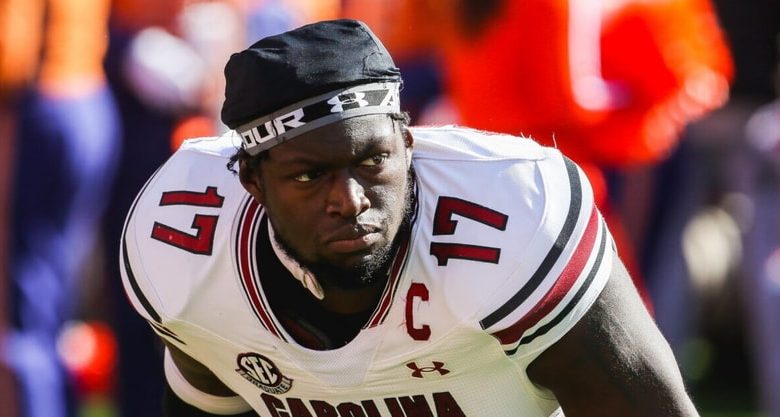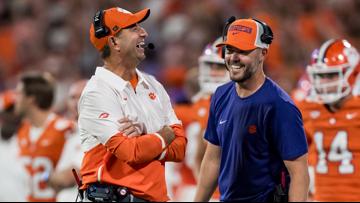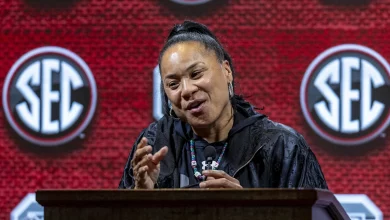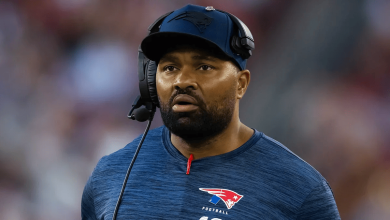Demetrius Knight reflects on his history as a quarterback leading to him becoming “quarterback of the defense” ready for the NFL

Demetrius Knight’s journey from quarterback to linebacker has been nothing short of extraordinary. As a young athlete, Knight initially made his mark as a quarterback, leading his high school and college teams with confidence and a deep understanding of the game’s strategic elements. Over time, however, Knight found himself transitioning to the defensive side of the ball, where he discovered a new passion and ultimately became the “quarterback of the defense” for his college football team. His story is one of resilience, adaptability, and the relentless pursuit of greatness, and as he prepares for the next step in his career, Knight reflects on how his unique history as a quarterback has shaped his future in the NFL.
Early Days: A Quarterback’s Foundation
Growing up, Demetrius Knight was always the player to watch on the football field. From a young age, he had a natural talent for reading defenses, making quick decisions, and leading his teammates to victory. His instinctive ability to manage the game from behind center, making crucial plays in the heat of the moment, set him apart from many of his peers. As a quarterback, Knight developed the discipline, vision, and mental acuity that would later serve him well in his transition to defense.
Knight’s high school days were marked by consistent success as a quarterback. His football IQ was off the charts, and he often found ways to make the most out of situations where lesser quarterbacks might have crumbled under pressure. He led his team through tight games and critical moments, demonstrating an ability to keep a cool head while managing the game. The quarterback position provided him the opportunity to understand the offensive mindset of opponents, recognizing how plays unfold and how defenses react to various strategies.
Knight’s playmaking ability as a quarterback also made him an effective leader on and off the field. He took charge of the huddle, calling plays and motivating his teammates, and his success was measured not just in his statistics but in the confidence he instilled in those around him. This leadership role became a core aspect of his identity and would carry over to his future endeavors on defense.
However, despite the success he experienced in his early football career as a quarterback, Knight’s path would eventually take a turn. As he moved to the next level of play in college football, Knight’s role would evolve in ways he couldn’t have anticipated.
The Shift to Defense: Finding a New Identity
As Knight transitioned to college football, he quickly realized that playing quarterback at the next level came with a new set of challenges. While his football IQ and leadership abilities continued to shine, his physical attributes and skill set started to show that his future might lie on the other side of the ball. With his size, strength, and athleticism, Knight was eventually converted to linebacker, a move that would change his football trajectory entirely.
The shift from quarterback to linebacker may seem unconventional, but Knight was up for the challenge. His previous experiences as a quarterback gave him a unique perspective on the game. He understood the ins and outs of offensive strategy and the thinking of quarterbacks, making him well-equipped to read offenses and anticipate plays. His deep knowledge of how offenses operate and how quarterbacks think provided him with a competitive edge that few linebackers possess.
As a linebacker, Knight quickly adjusted to his new role, bringing his quarterback mentality with him. He saw the game from a different perspective, not from behind center but from a vantage point that allowed him to see everything happening in front of him. The change in position, however, did not diminish his leadership qualities. Knight’s ability to read the game, communicate effectively with his teammates, and call the shots on the field made him the “quarterback of the defense.”
This transition allowed Knight to demonstrate his versatility and football IQ. He became a player who not only possessed the physical attributes necessary to succeed but also the mental fortitude to direct his defense and make impactful plays. His quarterback background gave him the confidence to lead his team from the defensive side of the ball, and he quickly became one of the most respected players on the field.
Becoming the Quarterback of the Defense
As Knight settled into his role as a linebacker, it became clear that he had found his true calling. He embraced the role of the “quarterback of the defense,” a position of leadership where he would read the offense, communicate defensive calls, and orchestrate his teammates’ positioning on the field. This unique skill set, developed through his experience as a quarterback, allowed Knight to thrive.
Knight’s leadership on the field was critical in rallying his defense. He directed traffic, ensuring that everyone was in the right place and reading the offensive formation correctly. His ability to communicate, combined with his understanding of offensive tendencies, made him a valuable asset for his team. Just as a quarterback must manage the tempo of the game, Knight became the leader of his defense, managing its flow and setting the tone for each game.
Over time, Knight became a playmaker on the defensive side of the ball. He used his quick decision-making ability, developed as a quarterback, to react in real-time and make impactful plays. Whether it was a crucial interception, a game-changing tackle, or a forced fumble, Knight’s instincts were sharp, and he used his football intelligence to outsmart the opposition. His transition to linebacker did not signal a loss of leadership or playmaking ability—in fact, it enhanced those qualities.
One of the key aspects of Knight’s success as the “quarterback of the defense” was his ability to anticipate the offense’s next move. As a quarterback, he had spent years studying the opposing defense, looking for weaknesses to exploit. Now, as a linebacker, he flipped the script and began reading the offensive plays to exploit those same weaknesses. His deep understanding of offensive schemes allowed him to be one step ahead, consistently disrupting plays and creating turnovers. His ability to recognize formations, route patterns, and timing helped him become one of the most dangerous defensive players on the field.
Preparing for the NFL: Knight’s Readiness
As Knight’s college career progressed, it became clear that his future in football would not be limited to the collegiate level. His combination of athleticism, intelligence, and leadership on the field made him a prime candidate for the NFL. Knight’s history as a quarterback, and his transition to linebacker, gave him the versatility and unique skill set that teams are looking for in today’s NFL defenses.
Preparing for the NFL draft, Knight has focused on refining his skills as a linebacker. His previous experience at quarterback has served as a foundation, helping him approach the game from a different perspective and positioning him as a dynamic player ready for the next level. His knowledge of offensive schemes, combined with his ability to lead and read the field, makes him a potential asset to any NFL team in need of a smart, instinctive, and physical linebacker.
Knight’s focus has been on continuing to improve his physical attributes—speed, strength, and agility—while also sharpening his leadership and mental game. As a linebacker, he needs to be able to react quickly to offensive formations, adjust his positioning, and make critical decisions on the fly. His quarterback experience allows him to anticipate what the offense will do, and this gives him a competitive edge that most linebackers don’t possess.
Knight’s ability to communicate and lead on the field is another trait that will help him make an immediate impact in the NFL. Just as he was the leader of his college defense, Knight will be expected to step up and take charge in the NFL. His ability to inspire and organize his teammates is something that coaches value highly, and Knight’s leadership is something that will set him apart in the draft process.









